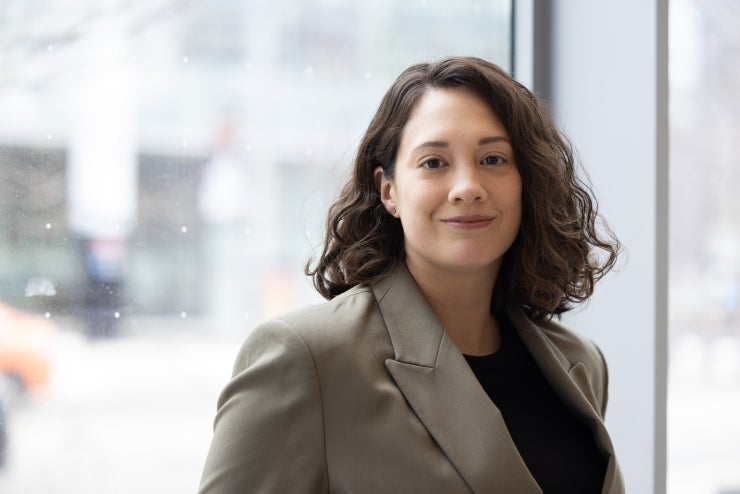When Karina Vold began her postdoctoral research at the Leverhulme Centre for the Future of Intelligence at the University of Cambridge in 2017, the idea of focusing on philosophy and the still emerging field of artificial intelligence drew quizzical looks.
"People were like, really? You're working on AI?" says Vold, who is now an assistant professor in the University of Toronto's department of philosophy and the Institute for the History and Philosophy of Science & Technology (IHPST) in the Faculty of Arts & Science.

An assistant professor of philosophy, Karina Vold says debates about whether AI systems could be considered "conscious" are closely intertwined with how we treat such systems from an ethical and moral perspective (photo by Polina Teif)
These days, however, Vold's choice appears prescient. Working at the intersection of philosophy, cognitive science, and AI ethics, Vold is taking part in an urgent global discussion about a fast-moving technology that some say will have a revolutionary impact on the economy, society - even what it means to be human.
She also finds herself back at an institution (she did her bachelor's degree at U of T) that's uniquely positioned to tackle these and other big AI questions. It's the home of U of T University Professor Emeritus Geoffrey Hinton - who received the Nobel Prize in Physics last year for his fundamental work on deep learning, the technology that sparked today's AI boom - and initiatives such as the Schwartz Reisman Institute for Technology and Society, which has a focus on AI safety and counts Vold as a research lead.
The science of consciousness
Vold says she's particularly interested in AI's impact on citizens, its role in modern society, as well as questions around its capacities.
The science of consciousness, for example is an area that philosophers have grappled with for decades that has now suddenly become a hot topic in AI circles because of rapid advances made by large language models such as ChatGPT.
"There's been a lot of work on other psychological terms like beliefs, desires, pain, creativity, curiosity - terms that are psychological in nature in the sense they tend to attribute a kind of mindedness to the system," she says. "And there's a history of how careful we are at using these terms when we try to assess other biological systems."
For example, Vold says, "in comparative psychology, it's a very high bar to make the claim that a lobster feels pain or that a raven is curious or creative. You have to be thoughtful about how you design experiments.
"[But] these very same terms are now getting used in computer science - in ways that are sometimes too fast and loose."
Why is this important? Vold says terms such as "consciousness" are closely intertwined with how we treat these systems from an ethical and moral perspective.
"There's a new wave of people talking about AI systems as agents, for example, she says. "But if the public gets used to recognizing these systems as conscious, or agents, we might be quick to give them rights and protections that we don't give other biological species."
Vold says interdisciplinary conversations, like the ones fostered at the Schwartz Reisman Institute, are critical to navigate these and other issues.
Reasons for optimism
Yet, while Vold takes seriously warnings about AI's potential to run amok with potentially damaging consequences, she generally counts herself as a techno optimist - and she says some of that hopefulness comes from the students who show up in her U of T classes.
"I'm in a unique department--the Institute for the History of Philosophy of Science and Technology," she says. "We get students from the sciences - a mix of computer scientists, engineers [and] cognitive scientists there's been some long philosophical discussions and questions such as: Can AI be creative? Can AI be curious? Can AI have consciousness? Do various AI really speak? Does it really understand?"
That kind of cross-pollination of ideas - one that mirrors Vold's hybrid role in both the arts and sciences - are exactly the types of academic discussions she says are critical to realizing a future where AI lives up to its transformative potential, from curing diseases to addressing climate change.
"My sense is computer scientists are interested in these philosophical questions and want to do things responsibly as they build these technologies."










